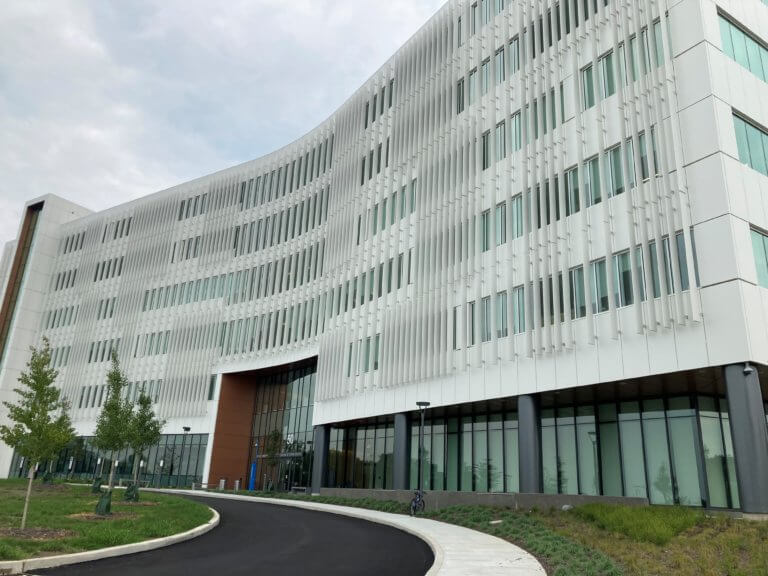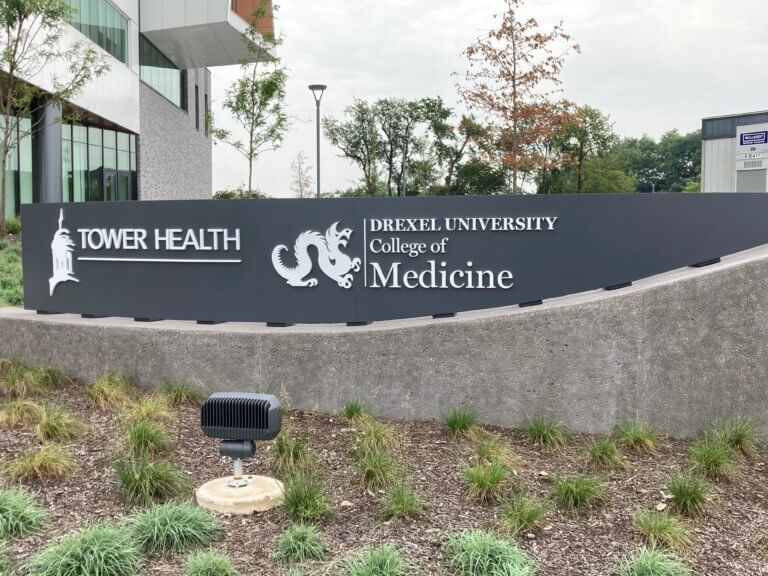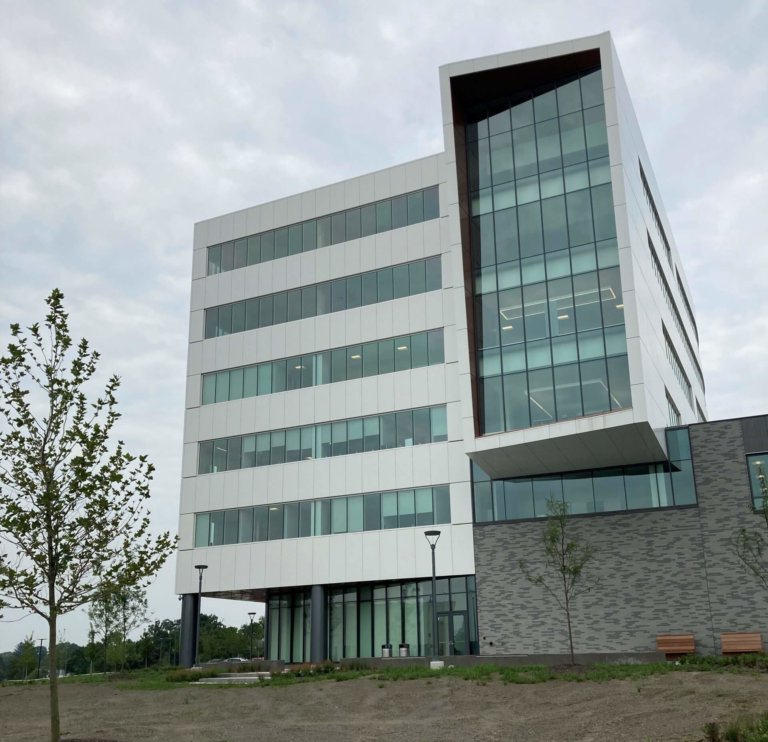
Drexel University College of Medicine Opens at the Knitting Mills Complex in Berks County, Pennsylvania
A ribbon cutting ceremony was held on July 27, 2021, to celebrate the opening of the Drexel University College of Medicine at Tower Health in Wyomissing, Pennsylvania. The facility welcomed its inaugural class of medical students at the 4-year regional medical campus a week later. “What a proud day it is for all of us; for Drexel, for Tower Health, and for the great community of Reading,” remarked John Fry, Drexel University President, at the ceremony. “This state-of-the-art facility is ready to go in record time allowing our first class of 40 medical students to be here next week. What a day that will be.” At full capacity, the medical college will host 200 students from around the world.

Plans to build the medical school were announced in April 2018, and construction began in June 2019. An extremely aggressive schedule allowed for an on-time opening for the 2021-22 academic year. The project was granted a waiver that allowed construction to continue during the COVID-19 pandemic due to its classification as an essential healthcare project. The new, state-of-the-art facility houses standardized patient exam rooms, an anatomy laboratory, small group learning areas, and simulation laboratories that will promote interdisciplinary education. Drexel University medical students already receive training from faculty physicians at Reading Hospital, the flagship of the Tower Health network, which is located less than 1 mile from the new campus. “Our medical students have been receiving their clinical education at Reading Hospital through a long-standing academic affiliation agreement and have been making an impact on medical care in Berks County for decades,” said President Fry. “Our new campus will increase their engagement with both patients and the community and provide greater opportunities to train and go on to be leaders in medicine, especially in areas in need of more physicians.”
The Drexel University facility was built on the North Campus of the Knitting Mills complex – the site of the former Vanity Fair Outlet complex. The recently redeveloped 53-acre property has a long history of innovation and industry. In the late 1800s, Ferdinand Thun and Henry Janssen, both German immigrants and industrialists, collaborated with the Borough of Wyomissing to create an idyllic and unique company town centered around their industries. Their development included a savings and loan, public library, fire company, public museum, and an extensive public park system. Wyomissing Industries, consisting of Textile Machine Works (manufacturing of knitting machines), Narrow Fabric Company (braided products), and Berkshire Knitting Mills (hosiery and fabrics) was incorporated at the site in 1906. By the 1940s, the enterprise had expanded to over 65 acres with 1 million square feet under roof and the largest automated foundry in the country.

The property was re-purposed when Vanity Fair Mills opened an “outlet store” in 1970 to sell excess inventory. This business model was a huge success, and the operation grew significantly through the 1980s. At its peak, over 6 million shoppers per year visited VF Outlets – the “Outlet Capital of the World.” With many newer facilities to choose from, however, the popularity of the aging facility declined in the 1990s. By 2015, much of the facility was vacant and underutilized. Equus Capital Partners, L.P. (Equus) purchased the complex in 2016 and began reimagining the site as a modern, mixed-use commercial and retail development.
Environmental Standards worked with Equus to conduct environmental due diligence prior to acquisition of the property. Formerly, portions of the property were used for textile manufacturing, auto repair, printing, dying, and as a foundry. In addition, multiple underground and aboveground storage tanks were used historically to store various petroleum products. A Phase I environmental site assessment conducted by Environmental Standards led to the conclusion that recognized environmental conditions (RECs) were present at certain portions of the property. As such, Environmental Standards conducted a series of soil and groundwater quality investigations starting in December 2015. The project was enrolled in Pennsylvania’s Land Recycling and Environmental Remediation Standards Act program (Act 2), and assessment and remediation were overseen by the Pennsylvania Department of Environmental Protection (PA DEP). Individual parcels were systematically taken through the assessment and remediation process to address soil impacted with polycyclic aromatic hydrocarbons (PAHs) and several metals. PA DEP approved a Final Report for the parcels comprising the former VF Outlet complex in 2016, thereby providing environmental liability protection under Act 2. This set the stage for the redevelopment to begin.
Environmental issues were more complex at Parcel 9, the former foundry lot and future home of the Drexel College of Medicine. Characterization and remediation at Parcel 9 were, therefore, conducted independently of the other parcels. Ultimately, a remediation strategy consisting of pathway elimination (capping) was implemented at Parcel 9. PA DEP approved the Act 2 Final Report for Parcel 9 in April 2018 allowing redevelopment of this important parcel to commence.
Equus has invested over $200M on the project while utilizing very limited public funding. The Knitting Mills has now reemerged as the premier corporate headquarters and innovation center in Berks County. To date, 700,000 square feet of office, laboratory, medical, educational, and retail space has been created. It is anticipated that 1,100 full-time and 1,300 indirect jobs will be created because of the redevelopment project. In addition, $168M in state revenue is projected. Key components of the redevelopment include the UGI Energy Services corporate headquarters, Tower Health corporate offices and training center, Sly Fox Taphouse, a Wawa convenience store, and offices for the Orthopedic Associates of Reading on the parcels where the VF Outlet once operated. The North Campus is quickly becoming an innovation and technology hub with the Teleflex/Arrow Research & Development and Innovation Center and the Drexel College of Medicine making this parcel home.
Equus was very much committed to honoring the history and tradition associated with the property by preserving architectural and historical features during redevelopment. The original Berkshire Knitting Mills “Blue Building” was transformed into the UGI Energy Services headquarters. Equus maintained the historical architectural aspects of this iconic building. Equus’ innovative strategy has included renovation of existing buildings to the extent feasible while upgrading and retrofitting the buildings with state-of-the art systems and facilities. Equus has also retold and memorialized the site history through a series of monuments throughout the campus that pay homage to the proud history of the Berkshire Knitting Mills.
The impacts of the Knitting Mills project are already being seen beyond the project boundaries. Wyomissing was recently awarded $2M by the Commonwealth Financing Authority for the Fourth Street Extension Project. This project is designed to improve traffic and promote economic development along one of Wyomissing’s busiest corridors. “The scope and pace of area redevelopment projects like the Knitting Mills are creating tremendous positive regional impacts,” according to State Senator Judy Schwank. “The Fourth Street Extension Project will help ensure that our local transportation infrastructure can accommodate this growth, which benefits pedestrians, bicyclists and motorists alike.”
Equus’ overall vision and implementation of the Knitting Mills redevelopment is a story of innovation. The goal from the outset was to create a vibrant, modern, mixed-use facility that would serve as a center for innovation – much like the Berkshire Knitting Mills did in the past. The Knitting Mills redevelopment project has lived up to that vision and is helping to create a healthier and more vibrant community.

